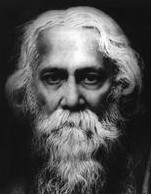 拉宾德拉纳特·泰戈尔(Rabindranath Tagore),印度著名诗人、哲学家和印度民族主义者,1913年他成为第一位获得诺贝尔文学奖的亚洲人。他的诗中含有深刻的宗教和哲学的见解,对泰戈尔来说,他的诗是他奉献给神的礼物,而他本人是神的求婚者。泰戈尔的诗在印度享有史诗的地位,代表作《吉檀迦利》《飞鸟集》。
拉宾德拉纳特·泰戈尔(Rabindranath Tagore),印度著名诗人、哲学家和印度民族主义者,1913年他成为第一位获得诺贝尔文学奖的亚洲人。他的诗中含有深刻的宗教和哲学的见解,对泰戈尔来说,他的诗是他奉献给神的礼物,而他本人是神的求婚者。泰戈尔的诗在印度享有史诗的地位,代表作《吉檀迦利》《飞鸟集》。
在这首诗歌中,作者阐述了:生与死本事一种永远无法逾越的距离,而近在咫尺却形同陌路是单恋的心与所爱的人之间遥远的距离。相爱却不能在一起,有情人无法成眷属,是千古遗憾的情人之间的距离,而明明爱着却装着不放在心上,是更加矛盾而痛苦的距离。
The Furthest Distance in the World—Rabindranath Tagore
世界上最遥远的距离——罗宾德拉纳特·泰戈尔
The furthest distance in the world,
世界上最遥远的距离,
Is not between life and death,
不是生与死之间的距离,
But when I stand in front of you,
而是我站在你面前,
Yet you don’t know that I love you.
你却不知道我爱你。
The furthest distance in the world,
世界上最遥远的距离,
Is not when I stand in front of you,
不是我站在你面前,
Yet you can’t see my love,
你却看不到我对你的爱,
But when undoubtedly knowing the love from both.
而是感受到对方坚定的爱意。
Yet cannot be together
却不能在一起
The furthest distance in the world,
世界上最遥远的距离,
Is not being apart while being in love,
不是相爱的人不能在一起,
But when plainly cannot resist the yearning,
而是明明不能停止思念,
Yet pretending you have never been in my heart.
却装作对方从未走进自己心间。
The furthest distance in the world,
世界上最遥远的距离,
Is not when painly cannot resist the yearning,
并不是当不能停止思念时
yet pretending you have never been in my heart,
却装作对方从未走进自己心间。
but using one's indifferent heart,
是用冷漠的心,
To dig an uncrossable river,
为爱你的人,
For the one who loves you.
挖掘一条无法穿越的鸿沟。
 拉宾德拉纳特·泰戈尔(Rabindranath Tagore),印度著名诗人、哲学家和印度民族主义者,1913年他成为第一位获得诺贝尔文学奖的亚洲人。他的诗中含有深刻的宗教和哲学的见解,对泰戈尔来说,他的诗是他奉献给神的礼物,而他本人是神的求婚者。泰戈尔的诗在印度享有史诗的地位,代表作《吉檀迦利》《飞鸟集》。
拉宾德拉纳特·泰戈尔(Rabindranath Tagore),印度著名诗人、哲学家和印度民族主义者,1913年他成为第一位获得诺贝尔文学奖的亚洲人。他的诗中含有深刻的宗教和哲学的见解,对泰戈尔来说,他的诗是他奉献给神的礼物,而他本人是神的求婚者。泰戈尔的诗在印度享有史诗的地位,代表作《吉檀迦利》《飞鸟集》。












